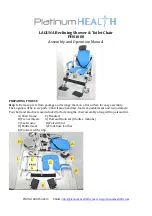
WARNING!
Risk of overturning
The wheelchair could tip forwards if you stand
on the footrest.
– Never stand on the footrest when getting in
and out.
CAUTION!
If you disengage or damage the brakes the
wheelchair could roll away out of control.
– Do not support yourself on the brakes when
getting in and out.
IMPORTANT!
The mudguards and armrests could become
damaged.
– Never sit on the mudguards or armrests when
getting in and out.
1.
Propel the wheelchair as near as possible to the seat
that you want to move to.
2.
Engage the parking brakes.
3.
Remove the armrests or move them upwards out of
the way.
4.
Detach the leg rests or swing them outwards.
5.
Place your feet on the ground.
6.
Hold the wheelchair and, if necessary, also hold a fixed
object in the vicinity.
7.
Move slowly to chair.
6.5 Driving and steering the wheelchair
You drive and steer the wheelchair using the handrims.
CAUTION!
A heavy load hanging on the backrest can affect
the wheelchair’s centre of gravity.
– Change your driving style accordingly.
6.6 Negotiating steps and kerbs
WARNING!
Risk of overturning
When negotiating steps you could lose your
balance and tip the wheelchair over.
– Always approach steps and kerbs slowly and
carefully.
– Do not go up or down steps that are higher
than 15 cm.
CAUTION!
An activated anti-tipper prevents the wheelchair
from tipping backwards.
– Deactivate the anti-tipper before going up or
down steps or kerbs.
WARNING!
Risk of injury to the assistant and damage to
the wheelchair
Tilting the chair with a heavy user can hurt the
assistant's back and damage the chair.
– Make sure to be able to safely control the
wheelchair with a heavy user before performing
a tilting maneuver.
Going down a step with an assistant
1.
Move the wheelchair right up to the kerb and hold the
handrims.
2.
The assistant should grasp both push handles, push
downwards firmly and tilt the wheelchair backwards so
that the front wheels lift off the ground.
3.
The assistant should then hold the wheelchair in this
position, push it carefully down the step and then tilt it
forwards until the front wheels are back on the ground.
Going up a step with an assistant
WARNING!
Risk of serious injuries
Going up steps and kerbs frequently can result
in earlier than expected fatigue break of the
wheelchair backrest. The user might fall out of
the wheelchair.
– Make sure to be able to safely control the
wheelchair with a user before performing a
tilting maneuver
1.
Move the wheelchair backwards until the rear wheels
touch the kerb.
2.
The assistant should grasp both push handles, push
downwards firmly and tilt the wheelchair backwards so
that the front wheels lift off the ground, then pull the
rear wheels over the kerb until the front wheels can be
placed back on the ground.
1653395-C
29
Summary of Contents for Rea Clematis Pro
Page 46: ...Notes...
Page 47: ...Notes...
















































